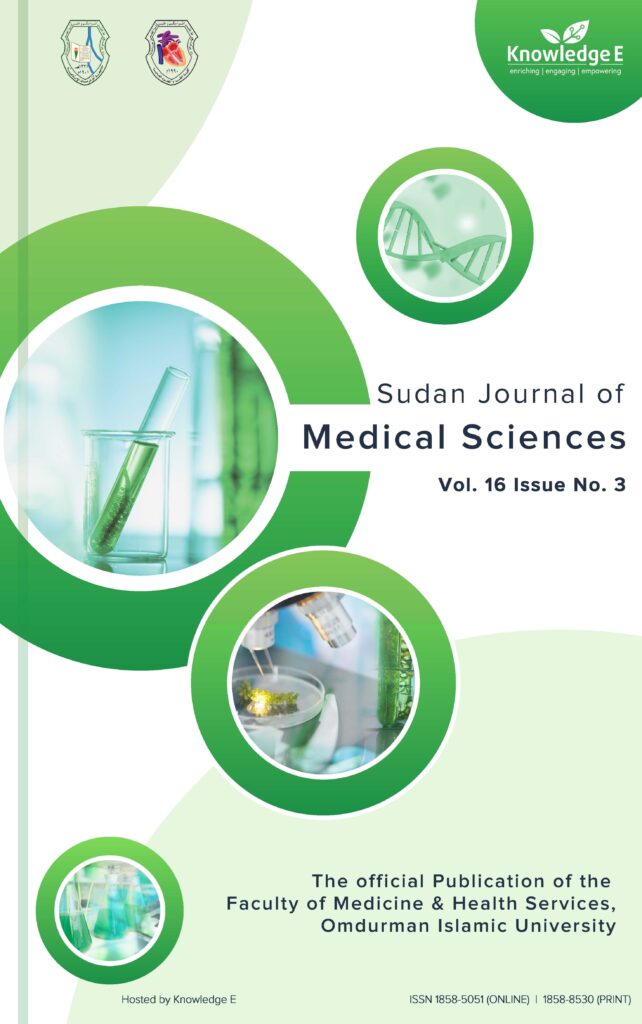
Sudan Journal of Medical Sciences
ISSN: 1858-5051
High-impact research on the latest developments in medicine and healthcare across MENA and Africa
Evaluation of LL 37 Lipoprotein as Innate Immunity Marker among Sudanese Patients Cutaneous Leishmania
Published date:Sep 26 2019
Journal Title: Sudan Journal of Medical Sciences
Issue title: Sudan JMS: Volume 14 (2019), Issue No. 3
Pages:91 - 96
Authors:
Abstract:
Background: The leishmaniasis is a group of diseases with a broad range of clinical manifestations caused by several species of parasites belonging to the genus Leishmania. LL-37/hCAP18, the only cathelicidin in human, is expressed as an 18-kDa preproprotein. The most prominent function of cathelicidins is their ability to inhibit propagation of a diverse range of microorganisms, which occurs at a micromolar range.
Aim: The study was aimed to evaluate the LL37 plasma level in Leishmania Sudanese patients.
Materials and Methods: In a case-control study, three hundred subjects were enrolled (200 as case and 100 controls). Five ml. of venous blood was collected in EDTA container, then plasma was obtained and stored frozen at -80ºC. LL 37 was estimated using competitive ELISA. The data were analyzed using SPSS version 21.
Results: The results revealed that 115 (57%) of Leishimania patients were male and 85 (43%) were female. Plasma LL 37 level was significantly increased in Leishmania patients (1.30±0.71) compared to the control (0.21±0.20) with (p-value 0.000).
Conclusion: Leishmania patients had higher levels of plasma LL37, suggesting effective anti-microbial immunity process enhancing healing of cutaneous leishmaniasis.
Keywords: Cathelicidins; LL37, Innate Immunity, Leishmania , Sudan.
References:
[1] Osman, O. F., Kager, P. A., and Oskam, L. (2000). Leishmaniasis in Sudan: a literature review with emphasis on clinical aspects. Tropical Medicine and International Health, vol. 5, no. 8, pp. 553–562.
[2] Abdalla, R. E., Ali, M., Wasfi, A. I., et al. (1973). Cutaneous leishmaniasis in Sudan. Transactions of the Royal Society of Tropical Medicine and Hygiene, vol. 67, no. 4, pp. 549–559.
[3] El-Safi, S. H., Peters, W., El-Toam, B., et al. (1991). Studies on the leishmaniases in Sudan. 2. Clinical and parasitological studies on cutaneous leishmaniasis. Transactions of the Royal Society of Tropical Medicine and Hygiene, vol. 85, no. 4, pp. 457–464.
[4] Abdalla, R. E. and Sherif, H. (1978). Epidemic of cutaneous leishmaniasis in northern Sudan. Annals of Tropical Medicine & Parasitology, vol. 72, no. 4, pp. 349–352.
[5] Abdalla, R. E., El Hadi, A., Ahmed, M. A., et al. (1975). Sudan mucosal leishmaniasis. Transactions of the Royal Society of Tropical Medicine and Hygiene, vol. 69, no. 5–6, pp. 443–449.
[6] Wu. W. K., Wang, G., Coffelt, S. B., et al. (2010). Emerging roles of the host defense peptide LL-37 in human cancer and its potential therapeutic applications. International Journal of Cancer, vol. 127, no. 8, pp. 1741–1747.
[7] Gallo, R. L. and Nizet, V. (2003). Endogenous production of antimicrobial peptides in innate immunity and human disease. Current Allergy and Asthma Reports, vol. 3, pp. 402–409.
[8] Huang, H. J., Ross, C. R., and Blecha, F. (1997). Chemoattractant properties of PR-39, a neutrophil antibacterial peptide. Journal of Leukocyte Biology, vol. 61, pp. 624–629.
[9] De, Y., Chen, Q., Schmidt, A. P., et al. (2000). LL-37, the neutrophil granule- and epithelial cell-derived cathelicidin, utilizes formyl peptide receptor-like 1 (FPRL1) as a receptor to chemoattract human peripheral blood neutrophils, monocytes, and T cells. Journal of Experimental Medicine, vol. 192, pp. 1069–1074.
[10] Heilborn, J. D., Nilsson, M. F., Kratz, G., et al. (2003). The cathelicidin anti-microbial peptide LL-37 is involved in reepithelialization of human skin wounds and is lacking in chronic ulcer epithelium. Journal of Investigative Dermatology, vol. 120, pp. 379– 389.
[11] Yang, Y. H., Wu, W. K., Tai, E. K., et al. (2006). The cationic host defense peptide rCRAMP promotes gastric ulcer healing in rats. Journal of Pharmacology and Experimental Therapeutics, vol. 318, pp. 547–554.
[12] Zasloff, M. (2002). Antimicrobial peptides of multicellular organisms. Nature, vol. 415, no. 6870, p. 389.
[13] Vandamme, D., Landuyt, B., Luyten, W., et al. (2012). A comprehensive summary of LL-37, the factotum human cathelicidin peptide. Cellular Immunology, vol. 280, no. 1, pp. 22–35.
[14] Bucki, R., Leszczyńska, K., Namiot, A., et al. (2010). Cathelicidin LL-37: a multitask antimicrobial peptide. Archivum Immunologiae et Therapiae Experimentalis, vol. 58, no. 1, pp. 15–25.
[15] Kulkarni, M. M., Barbi, J., McMaster, W. R., et al. (2011). Mammalian antimicrobial peptide influences control of cutaneous Leishmania infection. Cell Microbiology, vol. 13, pp. 913–923